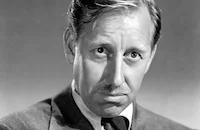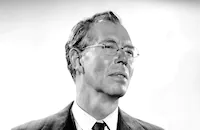Rachel and the Stranger

Brief Synopsis
Cast & Crew
Norman Foster
Loretta Young
William Holden
Robert Mitchum
Gary Gray
Tom Tully
Film Details
Technical Specs

Synopsis
In the mid-1800s, after his wife dies, Big Davey, an isolated Ohio backwoodsman, becomes concerned that, without a woman in his life, his young son Davey will grow up "wild." To assure his son's civility, Big Davey rides to the local stockade to secure the services of a housekeeper and is told about bondwoman Rachel. Although Big Davey buys the enslaved Rachel for eighteen dollars, Parson Jackson insists that he must marry her for the sake of propriety. Upon returning to the wilderness, Davey, who is still in mourning for his mother, rejects Rachel, while Big Davey regards her merely as a servant. The hard-working, gentle Rachel accepts her position in the household and dutifully follows Big Davey's orders. When her skills are compared unfavorably to Big Davey's first wife, however, Rachel determines to educate herself in backwoods' ways and secludes herself in the cabin cellar to learn rifle shooting. Soon after, Indian scout Jim Fairways, a longtime friend of Big Davey's and a former rival for his first wife's affection, shows up at the cabin. The flirtatious, handsome Jim is immediately attracted to Rachel and brings her out of her shell with his singing and guitar playing. Rachel surprises Big Davey when she accompanies Jim on his first wife's spinet and reveals her musical talents. After Jim leaves that night for the stockade, where he hopes to find his own wife, Big Davey tries to romance Rachel under a moonlit sky. His efforts are thwarted by a jealous Davey, however, and concerned about his son's insecurities, Big Davey tells Rachel that he is not ready to fall in love. Soon after, Jim returns to the cabin bearing gifts but no wife and begins a prolonged stay at the cabin. Jim quickly deduces what Rachel is doing in the cellar and offers her instruction on how to shoot. Jim's continued attentions to Rachel provoke Big Davey, and one night, he confronts his friend about his intentions. The scout freely admits his interest in Rachel and offers Big Davey forty dollars for her. Outraged with jealousy, Big Davey begins to brawl with Jim in front of Rachel, who then denounces both men and leaves the homestead in a huff. Jim, Big Davey and Davey soon catch up to Rachel in the woods, but she rejects their entreaties and beds down for the night by herself. Jim and Big Davey set up camp a few yards away, and although hungry, each man refuses to go hunting, fearful that while one is gone, the other will woo Rachel. Finally, Jim tells Rachel that he loves her and wants to marry her, while Big Davey asks Rachel to return with him but is unable to admit his love. Rachel's romantic dilemma is soon forgotten when she sees smoke in the sky and realizes that Shawnee Indians are attacking Big Davey's homestead. After racing back to the cabin, Big Davey and Jim confront the Indians, who are releasing the stock. Rachel is then captured by a Shawnee as she attempts to help her husband, but is rescued by Big Davey and is able to shoot the Indian. When the Indians set fire to the barn where Rachel, Jim and Big Davey are hiding, Rachel battles the flames and the men do their best to fend off the attackers. Eventually, the three are rescued by men from the stockade, and the Shawnee are forced to flee. In the wake of the attack, Jim decides to leave to pursue the Indians, while Big Davey finally embraces Rachel as his wife.

Director

Norman Foster
Cast

Loretta Young

William Holden

Robert Mitchum

Gary Gray

Tom Tully

Sara Haden

Frank Ferguson

Walter Baldwin
Regina Wallace
Frank Conlan
Crew
C. Bakaleinikoff
John Bambury
Gordon Bau
Richard H. Berger
Peter Bernard
Boyd Cabeen
Russell A. Cully
Albert S. D'agostino
Byron Fitzpatrick
Maury Gertsman
Virginia Griffith
Jack J. Gross
Edith Head
Alex Kahle
Terry Kellum
Harry Mancke
Harry Marker
Les Millbrook
Jack Okey
Ann Pyle
Edwin Pyle
Waldo Salt
Waldo Salt
Dore Schary
Lou Shapiro
Darrell Silvera
Dewey Starkey
John Sturtevant
Roy Webb
Roy Webb
Earl Wolcott

Photo Collections
Film Details
Technical Specs

Articles
Rachel and the Stranger
The picture started uneventfully enough. In 1947, Robert Mitchum, whose star was on the rise, and William Holden, back from the war and looking for a career re-charge, were cast opposite screen veteran Loretta Young in a pleasant frontier story about a recently widowed man (Holden) who buys a servant girl (Young) as his wife to help him care for his home and raise his young son. With their grief still fresh, the two won't accept the new woman in their lives as anything more than a servant. They treat her coldly until a waggish roaming scout (Mitchum) comes along and begins to court her; the husband soon begins to see Rachel in a whole new light.
With Rachel and the Stranger and two others in the can, Mitchum was poised for major stardom. But a little past midnight on September 1, 1948, the actor and a friend paid a visit to the home of starlet Lila Leeds. Relaxing on the sexy blonde's couch, puffing on what was later described in court as "medium-grade" marijuana, Mitchum and friends soon found themselves staring into the faces of a couple of LAPD narcotics officers. The arrest made national news, and as Mitchum was hauled off to jail, he expressed more than once his conviction that this was the end of both his career and his already shaky marriage.
The more righteous in the industry were all too eager to help him along the road to obscurity. Showbiz columnist Jerry Fidler called for a boycott of all Mitchum films, and in its weekly publication the Associated Theater Owners of Indiana expressed the skittishness of many exhibitors. Sparing Mitchum the rod, the association targeted "those who rush in to grab off a few dollars as the result of the publicity" and urged other exhibitors conscious of their "own local public relations" to pass on all Mitchum films until the matter was forgotten. But with three productions ready for distribution, pragmatic executives decided they couldn't afford to risk the millions they'd poured into the films and released Rachel and the Stranger immediately. The gamble paid off; the film got favorable reviews and did very well at the box office, even in conservative Boston, and during its Los Angeles engagement earned loud and lengthy applause at the beleaguered star's first moment on screen. Mitchum's career was not only saved, he got to show another side of himself in the movie, which included singing the Roy Webb/Waldo Salt folk song, "O-he, O-hi, O-ho." "I got a change in Rachel and the Stranger, some good grade sardonic comedy plus some 'corn,'" he said later. "I enjoyed doing it." He often named it as one of his three favorites among the many pictures he had made.
Part of Mitchum's enjoyment came from working with Loretta Young, whose Academy Award that year for The Farmer's Daughter (1947) didn't hurt the box office either. Everyone expected that the two would clash; on the surface, the highly disciplined and devoutly Catholic Young was not, to borrow the title of a later Mitchum picture, "his kind of woman." Young gave some stern advice to both her male leads about their excessive drinking habits (for which Mitchum good-naturedly called her "mother superior"), and this may have been the first appearance of her infamous swear box. Cast and crew alike were directed to drop a coin in the box for every curse, priced according to severity. It was a sign of Mitchum's sly and offbeat respect for his co-star when he told a columnist that after paying Young a nickel for every "damn," a dime for "hell" and a quarter for "goddam," he asked her, "What if I say "f***"?" He claimed her response was "That's free!" (Young later insisted the reason for the box's creation was not her objection to cursing, only blasphemy.) Apparently the two stars weren't as far apart as their images presented. According to a staffer in the office of Mitchum's agent, Young was "basically an earthy lady" beyond her "language hang-ups," and Mitchum was considered by those who knew him best to be a very intelligent and sensitive man, despite any efforts he made to present himself otherwise.
One final note of interest about Rachel and the Stranger: the screenplay and the lyrics to the five songs in the movie were written by Waldo Salt, who later won Oscars® for his scripts for Midnight Cowboy (1969) and Coming Home (1978).
Director: Norman Foster
Producer: Richard H. Berger
Screenplay: Waldo Salt, based on stories by Howard Fast
Cinematography: Maury Gertsman
Editing: Les Millbrook
Art Direction: Albert S. D'Agostino, Jack Okey
Original Music: Roy Webb
Cast: Loretta Young (Rachel), Robert Mitchum (Jim), William Holden (Dave), Gary Gray (Davey), Tom Tully (Parson Jackson), Sara Haden (Mrs. Jackson).
BW-80m. Closed captioning.
by Rob Nixon

Rachel and the Stranger
Quotes
Trivia
Notes
The working titles of this film were Rachel and Tall, Dark Stranger. Although modern sources claim that the picture was based on Howard Fast's short story "Good Neighbor Sam" as well as his story "Rachel," only "Rachel" is credited in contemporary sources. Waldo Salt's two writing credits were not included in the viewed print, but were listed in the copyright cutting continuity. Salt was blacklisted in 1951 as a result of his testimony before the HUAC, and it is possible that Howard Hughes, who controlled RKO at that time, May have ordered Salt's credits removed from later prints of the film. For additional information on HUAC and the Blacklist, for Crossfire.
Hollywood Reporter news items and the RKO Production Files contained in the UCLA Arts-Special Collections Library add the following information about the production: Just prior to directing this film, Norman Foster had worked extensively as a director in Mexico. Tested for roles were Bobby Driscoll, Dick Tyler and Kirk Douglas. Joel McCrea was offered one of the male leads in the picture. At an RKO sales meeting, production head Dore Schary took an impromptu vote for casting the role of "Jim," and Robert Mitchum won by an overwhelming majority. RKO borrowed William Holden from Paramount for the film.
Some exterior scenes were shot in and around Eugene, OR, including Fox Hollow and the MacKenzie River Stockade. Hollywood Reporter announced that Arizona was being scouted as a location as well, but it is not known if any shooting was actually done there. In one pre-production news item, Walter Daniels and Harold Barry were reported to have accompanied producer Richard Berger and art director Albert D'Agostino on location, but their participation in the final film has not been confirmed. Modern sources note that RKO rushed the picture into release to take advantage of the publicity surrounding Mitchum's September 1948 arrest for marijuana possession. (See entry above for The Big Steal for more information about Mitchum's arrest and trial.) According to modern sources, the film earned $395,000 at the box office and was one of RKO's top grossers of 1948.















